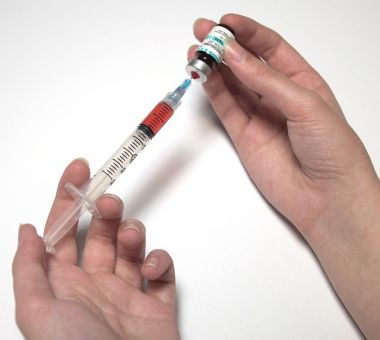Boycott polio vaccine, say Kenya's Catholic bishops

Kenya's Catholic bishops have urged a boycott of a polio vaccination programme over fears regarding its safety.
The mass oral vaccination programme, run by the World Health Organisation and UNICEF, is due to begin on Saturday. However, the bishops have said that people should boycott the vaccine until its safety has been established by independent tests.
The bishops' claims were strongly rebutted by the WHO's Global Polio Eradication Initiative in an email to Christian Today.
It is the second time the bishops have taken on the government over vaccination; they mounted a campaign last autumn against a tetanus programme, citing fears that the drugs contained an ingredient that induced miscarriages and sterility, and were being used as a covert means of controlling the country's population.
Polio, a highly infectious disease which can result in paralysis or death and affects mainly children under five, has been nearly eradicated after a world-wide effort over several decades and Africa is on the verge of being declared polio-free. However, the vaccination programme is necessary to control any recurrence of the disease and the bishops' opposition has been met with dismay by officials.
The ministry of health released a statement from Dr Nicholas Muraguri, director of Kenya's medical services, who said: "Any attempts aimed at mobilizing the public against taking their children for vaccination is a serious violation of the right of children to health and survival.
"The ministry of health once again reassures the public of the safety of all vaccines used in Kenya. I therefore appeal to all stakeholders, especially the leadership of the Catholic Church, to continue supporting" the immunization campaign.
The chair of the Kenya Conference of Catholic Bishops, Rt Rev Philip Anyolo, told journalists: "We are not in conflict with the Ministry of Health, but we have an apostolic and moral duty to ensure Kenyans are getting safe vaccines."
He said that after the tetanus campaign, the Church had recommended that all mass vaccination programmes should involve independent testing of the drugs.
However, health cabinet secretary James Macharia said that the ministry could not accede to demands made by different religious groups. "We have different religions with different doctrines. If we allow health to be managed based on people's beliefs, we will have major problems in this country," he said.
"We are not about to back down on campaigns because of one religion. The bigger picture is the children who are at risk."
Sona Bari, a spokeswoman for Global Polio Eradication Initiative, told Christian Today she believed the Kenyan government was "addressing these concerns very ably".
"All vaccines used in Kenya, whether in routine immunization or in supplementary immunization activities, are WHO-prequalified," she said. "This means that all vaccines supplied through the UN agencies meet international standards of safety and quality. The vaccines are under the oversight of the National Regulatory Agency, and subject to periodic reassessment by WHO.
"Protection from vaccine-preventable disease is a key service provided to all Kenyan children. Vaccination against polio has enabled Kenya to stop polio transmission. However, as long as polio circulates anywhere in the world, it is essential for Kenyan children to be protected from this disease."
She stressed that "vaccines used in Kenya are safe, effective and protect children from life-threatening disease. In global polio eradication efforts, over 10 billion doses of oral polio vaccines have been used, and an estimated 13 million people are walking who would have been paralyzed without vaccination."
The bishops' campaign is the latest to underline the influence of religious leaders on vaccination programmes. In the early 2000s, leaders in Northern Nigeria advised followers not to have their children vaccinated against polio, resulting in a setback for attempts to eradicate the disease. They also advised against the measles vaccine; in the first three months of 2005 Nigeria suffered 20,000 measles cases and 600 deaths. In 2007, 200 children died in an outbreak in Borno State.
Taliban leaders in Pakistan and Afghanistan have also opposed vaccination programmes, denouncing them as an American ploy to sterilise Muslim women. Vaccination programme leaders have been assassinated.
The attempt to eradicate polio in Pakistan, where it is still endemic, received a major setback because of the CIA's use of a hepatitis vaccination programme to locate Osama bin Laden in 2011. A local doctor, Shakil Afridi, obtained samples of the DNA of children in bin Laden's Abbottabad compound and helped identify his hiding place. US intelligence agencies announced in May that they would end the practice, a move welcomed by health officials there.
Dr Nima Abid, a senior official with the World Health Organisation in Islamabad, said then: "It is good news. If they stick to it then it will help with convincing people that vaccines are not part of a conspiracy.
"At the time it was really bad for all our immunisation programs. It hurt us a lot. Health programs should never be used as a front for intelligence agencies. It undoes all our work and puts our people at risk."
More recently, campaigners in Pakistan have claimed a breakthrough in engaging Muslim leaders in the anti-polio cause, with the influential Jamiatur Rasheed madrassah declaring its support.











